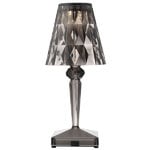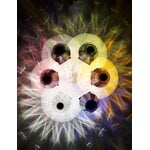Kartell’s Battery is a small and practical table light that features a beautiful crystal-like shade. The cordless light can be easily moved around, since it has a battery life of up to six hours and can be recharged with a USB cable. Battery table light, designed by Ferruccio Laviani in 2015, brings your décor a pleasant sense of freedom and Italian splendour.



Battery lamp, smoke
Kartell
Description
Kartell’s Battery is a small and practical table light that features a beautiful crystal-like shade. The cordless light can be easily moved around, since it has a battery life of up to six hours and can be recharged with a USB cable. Battery table light, designed by Ferruccio Laviani in 2015, brings your décor a pleasant sense of freedom and Italian splendour.
Product details (19)
- Material
- PMMA
- Colour
- Smoke
- Width
- 12 cm
- Depth
- 12 cm
- Height
- 26 cm
- Light source
- Integrated 0.8W LED
- Colour temperature
- 2,700 K
- Luminous flux
- 110 lm
- Lifetime
- 50,000 h
- IP rating
- 54
- Protection class
- III
- Voltage
- 3.7 V
- Power supply
- 5V 1000mA
- Certifications and labels
- CE marked: tested and approved according to European standards
- Plug
- EU plug
- Weight
- 0.36 kg
- Integrated switch
- Yes
- Dimmable
- No
- Notes
- USB cable included
- Product ID
Designer
The Italian designer Ferrucio Laviani (b.1960) studied architecture and design in Milan and graduated in 1986. Since 1983 he collaborated with Studio de Lucchi and between 1986 and 1991 he worked there. In 1991 he established his own studio in Milan.
He has worked with big clients like Kartell, Foscarini, Dolce & Gabbana and Jan Hennesy & Co. Some of the earlier products he designed for Kartell like the FL/Y pendant and Bourgie table lamp are still one of the best selling products around the world.
View all productsReviews (0)
Sustainability
The Product Sustainability Framework, our criteria of sustainable design, helps you find the most sustainable products in our selection. Read below which sustainability criteria this product has met.
Working conditions & labour 9/9
-
Equal opportunities for all employees
-
Commitment to UN Global Compact, fair compensation for all employees
-
Corporate responsibility requirements defined and communicated for suppliers
-
Systematic work for improved inclusion and well-being in the workplace
-
Transparent supply chain
-
Suppliers' compliance to a code of conduct ensured
-
Direct suppliers audited and certified
-
Compliance to the UN Guiding Principles on Business and Human Rights ensured in the supply chain
-
Support for community involvement in the supply chain
Eco-friendly production 8/9
-
Fair and resource-wise water-use in production
-
No incineration or landfilling of returned items
-
No use of endangered species as materials
-
No direct environmental emissions or waste (excl. GHGs) from production
-
The sustainability of direct suppliers' production is addressed and monitored
-
Production and material sourcing that respect biodiversity, animal rights, and natural ecosystems
-
Material-efficient and ecological packaging
-
No potentially harmful chemicals used in own production
-
Positive impact on nature’s well-being through operations that regenerate natural ecosystems
Climate impact 4/8
-
Company's direct greenhouse gas emissions identified and commitment to reduction
-
Product's carbon impact identified and commitment to reduction
-
Guidance on energy- and eco-efficient use of the product
-
Contribution to climate initiatives beyond the brand’s direct operations
-
Low-carbon or compensated transportation
-
Carbon footprint of the product calculated and goals set to reduce it
-
100 % renewable energy in own production and operations
-
Carbon neutral or carbon negative product
Sustainable materials 5/6
-
Sustainable and long-lasting material choices
-
No harmful or hazardous substances
-
Responsible raw material sourcing and production
-
Materials suited for circularity: monomaterials, recyclable finishings, renewable or recycled contents etc.
-
Ecological materials: natural, biodegradable, recyclable or recycled contents
-
Outstanding materials in terms of innovativeness, responsibility, sustainability and circularity: local production or sourcing, 100 % recycled content, C2C-certification etc.
Circular design 4/5
-
High aesthetic quality promoting long-term use of the product
-
Technically durable product design and material choices
-
Design for enduring life-long quality
-
Design and support for product maintenance, repair and upgradability
-
Innovative circular design solutions: circular service system, resale platform, remanufacturing, collection of used products, etc.






